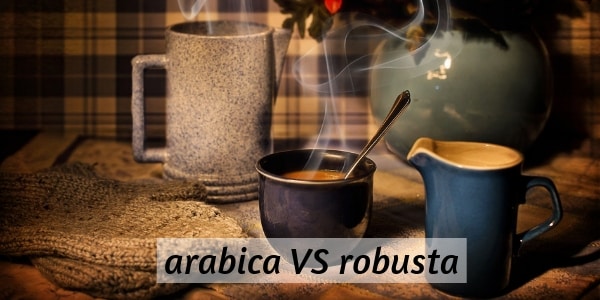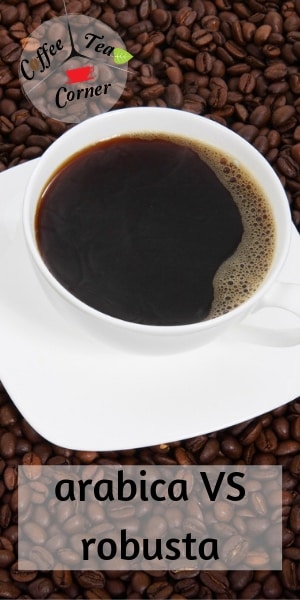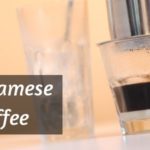Going out to get some new coffee, but you're not decided which way to go ? Well then let me help you pick between Arabica and Robusta, or even see why you can settle for a blend between the two.
Arabica vs robusta has been a debate since the beginning of coffee, and it's something that's got coffee lovers discussing the finer points of brewing and farming coffee.
No worries, I'll make things as clear as possible, and give my two cents on the matter as well. Now let's start with the main difference between Robusta and Arabica coffee.
Table of Contents
1. Arabica coffee beans are more flavorful and sweet than Robusta
This is the first point you'll ever run into when discussing coffee with anyone. And for good reason, since we're all very subjective people and we like things a certain way.
The thing is that while you may love a pure Arabica, your friend might love Robusta beans. Even if their flavors are very, very different, you can still get along.
The reason so many people root for Arabica has many roots, which you'll notice throughout this article.
One of them is the fact that Arabica beans are simply easier on the palate of most people. They're sweeter and got more flavor than Robusta beans, because they have a higher sugar content (double almost) than Robusta.
The fat content in Arabica beans is also double the one in Robusta beans. As with milk or dairy, higher fat and sugar levels result in a tastier product.
So as a whole, Arabica is easier on the tongue for many people. But what about Robusta, what's wrong with it then ?
Well, nothing really, in my opinion. Then again take into account that I like Robusta a bit more than Arabica.
Robusta beans offer a very strong taste, almost like the coffee was burnt in some cases. There is a distinct nutty flavor, and even the brew seems to look darker than Arabica.
Back to flavor, Robusta beans are much earthier in flavor, and this doesn't sit well with many people. It's a harsh taste, and it still shines through even after milk and sugar.
If you were to take your coffee black, a cup of pure Robusta might be too much. Arabica is much milder and easier to deal with.
Given how many people prefer lighter tastes, on the sweeter side, it's no surprise Robusta beans are not always welcomed. But they have their uses.
2. Robusta beans are cheaper to mass produce than Arabica
When looking to mass produce an item, of course you'll look at the overall cost of producing and processing said item.
The case for Robusta beans is that they're so very very cheap to produce, compared to Arabica. They produce very large yields, and the plant itself grows almost double the size of the Arabica plant.
This means that the production cost is less than with Arabica beans, and they can be easily produced to serve customer needs.
That, added to how much people choose Arabica over Robusta led to devaluing the Robusta bean quite a lot.
To the point where it's easier to make decaf coffee with Robusta instead of Arabica.
The decaffeinization process is so expensive doing it with Arabica beans would be insanely costly.
So your bag of Robusta coffee will always be cheaper than Arabica, And if you get a blend than includes Robusta, it will often be cheaper.
In the end, this can benefit us coffee lovers, at least those who actually like Robusta's harsh taste.
3. Arabica beans are sensitive to insects and diseases
Another reason Robusta is so easy to mass produce is because it's highly resistant to most bugs, parasites, and coffee diseases out there. This makes it, again, very easy to tend to out on the field.
This also means that Arabica is a very delicate, and falls sick easily.
There was an incident, far back in history, when the Coffee Leaf Rust came to parts of Asia, Sri Lanka to be exact. This lead to the extermination of large crops of Arabica farms, and the neighboring countries suffered as well.
This is actually how Robusta was introduced to the masses. As a substitute for Arabica, and prized for its resilience. Hence the name of Robusta.
It can also survive in harsher environments than Arabica, and withstand high temperatures a bit better.
Still, Arabica is a very loved coffee bean, even as sensitive as it is. If anything, its price is higher also because of this.
Harder to tend to, very specific in its needs, and with a lower yield than Robusta, but a very large demand from consumers.
4. Robusta beans are often used a filler or lower end coffee
Remember how I mentioned Robusta has its uses ? Most of the time it's found in lower end coffee. Like many store-brand coffees that seems to taste a bit off, or too harsh.
Instant coffee is made of Robusta beans, since much of the coffee is lost during the production of instant coffee. Like with the decaf process, it's easier to do this with the cheaper Robusta.
Low end coffee often tastes very poor, and it's largely the bean's fault. Robusta does taste bad in some cases, and I've noticed the only good times I've had with Robusta is in a blend where there is some Arabica too, to take the edge off.
You'll find Robusta in many blended coffees, and annoyingly many of them don't state the Robusta to Arabica ratio.
So if your favorite coffee ever disappears off the shelves for some reason (I was in this position), you're going to have to try finding a new favorite by just guessing at it, rather than reading the label.
One thing to note though, Robusta coffee tends to be preferred when it comes to espressos. But not 100% Robusta beans. Rather a mix that contains about half Robusta, half Arabica.
This is because the Robusta seems to produce a better and thicker crema on top of the espresso, and this is important. Using only robusta will yield much more crema, but it will be too much and the taste will be off.
(If you like this article so far, you can pin it to your Pinterest board by clicking the image below. The article continues after the image.)
5. Arabica beans have half the caffeine content of Robusta beans
You'll often find Arabica mixed in with Robusta. This is because coffee brands are trying to balance out flavor and pleasing the general public, with a high caffeine content and depth.
This can only be achieved by adding some Robusta beans to the overall mix.
Robusta beans have nearly double the caffeine content of Arabica. Actually Robusta has 2.7% while Arabica's got just 1.5%. You might look at those percentages and wonder why the difference matters, since they're both so low.
A little goes a long way, and caffeine really matters in Robusta beans.
It's the high caffeine content that makes it so resistant to bugs and pests, and it's also what gives it that overly bitter taste.
Caffeine on its own is unbelievably bitter, and not friendly at all. A coffee bean high in caffeine won't have a very pleasant taste, so I think Robusta can be forgiven here.
And it's for this reason as well, that you'll find Robusta in blended coffees. Not only does it deepen the flavor, but it also raises the general caffeine level.
I don't know about you, but I've tested out some pure Arabica coffee, from different brands over the span of several months. Man was I disappointed.
To my taste buds, it was routinely weak, slightly acidic, and too... clear ? I don't know, I think I went through 6-7 brands and was disappointed most of the time.
After that, I went back the Robusta/Arabica blend I've always had and noticed the definite change in caffeine and taste. I did try my best to love Arabica, though.
6. You'll notice Arabica beans are oval, while Robusta beans are rounder
Now if you're buying pre-ground coffee, this won't matter too much to you.
But if you buy your coffee whole bean, then you'll notice a difference between the two coffee beans.
Robusta beans are much rounder than Arabica beans, and seem stouter in general.
When buying your whole bean coffee, if it's not labeled you'll be able to figure out at a glance the kind of coffee you're buying.
7. Arabica is about 60% of the world production of coffee, Robusta is less preferred
Arabica is what you'll find in most stores, since this is what the consumers prefer.
This means that coffee production revolves mostly around Arabica beans, but they have no specific country in which they grow.
They started out in Ethiopia, which is where the first coffee was found and brewed. Many coffees grown in Africa are Arabica types.
That being said, you can easily find Arabica beans in South America and Asia as well. Some countries even produce both beans.
Robusta beans however are most common in Asia, and a bit of South America as well. Some countries have adapted to the kind of coffee they grow, like Vietnam for example.
Vietnamese coffee is almost exclusively Robusta beans, and it's one of the densest and strongest, sweetest coffees you'll ever have. It's got sugar, condensed milk, and often ice because of the incredibly warm and humid climate.
Coffee can only be grown in the Coffee Belt area, which happens to include the Equator. And also 30 degrees north and south of said Equator.
The climate in those places is hot, humid, lots of high terrain, and plenty of sunshine to grow the plants. Actually Arabica is starting to decline in production, because of the global warming effects.
You see, Arabica is very heat-sensitive and even the difference of one Celsius degree can make things unbearable for it. Some countries are now looking for replacements in its stead, so the coffee trade will not be hurt.
8. Arabica was the 'first' coffee to be spread throughout the world
When discussing where coffee came from, some will say Ethiopia, some will say Yemen. The truth is, It's almost the same thing.
Yemen was part of Ethiopia, oh so many thousands of years ago, when Pangea was whole. That's when many plant seeds were spread out, and Ethiopia/Yemen was where it all started. Coffee, I mean.
Now, whether it was in fact an Ethiopian farmer who noticed his goats getting rowdy after eating coffee berries is how this all started, I don't know.
What's certain though is that from Ethiopia, coffee beans were brought to Yemen. Yemen had the very popular and visited port of Mocha (still standing today) and that led to the expansion of coffee around the world.
It was a very well established trading place, and coffee became a thing. It actually became an 'arabian' thing, because of the Arabian Peninsula Yemen is located on.
Form there on, the coffee bean that was the most well known was named Arabica, for its seemingly arabic place of birth, at least in the eyes of everyone else.
How and when Robusta was noticed as being a separate bean from Arabica, I do not know.
But the Coffee Leaf Rust is how Robusta came into the global trade, after Arabica was already very well known for some centuries. And when Arabica failed, Robusta was called in to help things out.
9. Robusta is better suited for large, heavily flavored coffee drinks
Back to the strong flavor of Robusta, we should also discuss how Robusta's ...robust nature makes it very well suited for many coffee drinks.
For example making a nice, cold iced coffee with Arabica might be okay. But making an iced latte, with all that milk and sugar will definitely drown out all the taste of coffee if you used Arabica.
Better to use Robusta, or at least half Robusta. Given that most of these drinks are made with espresso as a base, you can be certain there;s some Robusta in there.
Even better, using clod brewed Robusta will be a great way to bypass the overly bitter taste of hot Robusta. And still get the strong flavor of Robusta, along with its beautiful caffeine.
Now whether you decide to use Robusta coffee or not is up to you. I'm just saying you lattes and frappuccinos will be way stronger than with Arabica.
10. Arabica is better as a lighter roast, Robusta is great as a darker one
Given how flavorful Arabica can be, roasting it on a high temp would be a waste. There are dark roasted Arabica beans out there, yes, but their flavor is almost lost, and muted.
The reason behind this is that Arabica is often a floral, fruity coffee bean. Lighter roasts (everything up until medium) is going to bring that forward and give it a pleasant feel.
If you were to roast Arabica much darker, you would bring out the nuttier, chocolate-like flavor of the beans. While Arabica does sometimes produce this kind of flavor, it's most often found in Robusta beans.
As for Robusta beans, roasting them too much will only make them very bitter and taste almost burnt. Which is why Vietnamese coffee is so odd but tasty.
It's slow-roasted, but dark roasted Robusta, with a bit of butter and sugar added to the roasting process. The result is very reminiscent of caramel and butter.
Still, no coffee should be roasted on too high a setting. Often the coffee beans that are very dark roasted are meant to hide a flaw in their taste. The smokey, toffee flavor will overpower every other flavor in the bean.
So are Arabica beans better than Robusta ?
No, I wouldn't say this. My personal opinion aside, coffee is very much a taste thing. One person's favorite flavor might be another's pet peeve.
I do like Robusta, more than Arabica. But I know I need Arabica to balance things out.
The fact that Arabica' been touted as this wonderful, pure coffee is kind of misleading, There are very beautiful Robusta/Arabica blends out there as well.
And the fact that there is high quality Robusta kind of turns things on their heads. It's not widely available, but some specialty shops might have them.
So don't cast aside Robusta, rather acknowledge the favors it does to everyone's favorite, Arabica.
When I was running around tasting different coffee types, I very often found Arabica, and 100% Arabica at that. For me it was too thin, too weak, and I almost hated drinking my morning coffee.
Now could I say Arabica is worse than Robusta ? No. Neither can I say Robusta is worse than Arabica.
All I can say is that you really need to experiment with your coffee and see which you like best, on your own terms.
Final thoughts
This has been a long debated topic, and many people have many opinions.
I've tried here to provide you with just the facts, so you can see the main differences between Robusta and Arabica beans. Indeed robusta seems to be the uglier, harsher sister.
She's not very welcoming, and she's not for everyone. She does the heavy lifting, while Arabica makes sure everyone's happy and pleased with that they've got.
If you want to know more about coffee or tea, feel free to check the related articles below. Who knows what else you might find ?






